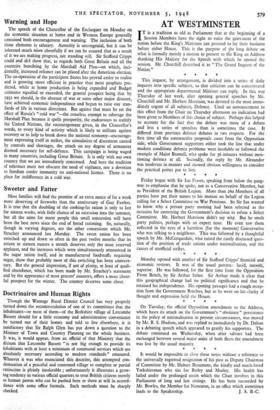AT WESTMINSTER
IT is a tradition as old as Parliament that at the beginning of a Session Members have the right to voice the grievances of the nation before the King's Ministers can proceed to lay their business before either House. This is the purpose of the long debate on what is formally merely a motion to present to the King an Address thanking His Majesty for the Speech with which he opened the session. Mr. Churchill described it as "The Grand Inquest of the Nation."
This inquest, by arrangement, is divided into a series of daily inquests into specific subjects, so that criticism can be concentrated and the appropriate departmental Minister can reply. In this way Thursday of last week, after opening general speeches by Mr. Churchill and Mr. Herbert Morrison, was devoted to the most imme- diately cogent of all subjects, Defence. Until an announcement to this effect from the Chair on Thursday afternoon no indication had been given to Members of this choice of subject. Perhaps this helped to account for the fact that the debate was more of a debate and less a series of speeches than is sometimes the case. It differed from previous defence debates in two respects. For the first time all the constructive proposals came from the Opposition side, while Government supporters either took the line that under modern conditions defence problems were insoluble or followed the example of Major Bramall, who spoke for 36 minutes without men- tioning defence at all. Secondly, the reply by Mr. Alexander was moderate in manner and showed obvious willingness to consider the practical points put to him. * * * * Friday began with Sir Ian Fraser, speaking from below the gang- way to emphasise that he spoke, not as a Conservative Member, but as President of the British Legion. More than 26o Members of all parties have put their names to his motion on behalf of the Legion calling for a Select Committee on War Pensions. So Sir Ian wanted to know why a private party meeting had been selected as the occasion for conveying the Government's decision to refuse a Select Committee. Mr. Herbert Morrison didn't say why. But he smelt party politics, perhaps with an expert nose. He even saw them reflected in the eyes of a harmless (for the moment) Conservative who was talking to a neighbour. This was followed by a thoughtful speech by Mr. McCorquodale, who raised the rarely discussed ques- tion of the position of trade unions under nationalisation, and the causes of unofficial strikes.
* Monday opened with another of Sir Stafford Cripps' financial and economic reviews. It was of the usual pattern: lucid, smooth,' superior. He was followed, for the first time from the Opposition Front Bench, by Sir Arthur Salter. Sir Arthur made it clear that this geographical change had no political significance and that he retained his independence. His opening passages had a rough recep- tion from the Government Benches, but as he went on his clarity of thought and expression held the House.
On Tuesday, the official Opposition amendment to the Address, which bases its attack on the Government's "obstinate" persistence in the policy of nationalisation in present circumstances, was moved by Mr. R. S. Hudson, and was replied to immediately by Dr. Dalton in a debating speech which appeared to gratify his supporters. The debate continued on Wednesday, when after salvoes had been exchanged between several major units of both fleets the amendment was lost by the usual majority.
* * * * It would be impossible to close these notes without a reference to the universally regretted resignation of his post as Deputy Chairman of Committee by Mr. Hubert Beaumont, the kindly and much-loved Yorkshireman who sits for Batley and Morley. His health has failed under the prolonged strain which the Chair involves in this Parliament of long and late sittings. He has been succeeded by Mr. Bowles, the Member for Nuneaton, in an office which sometimes










































 Previous page
Previous page